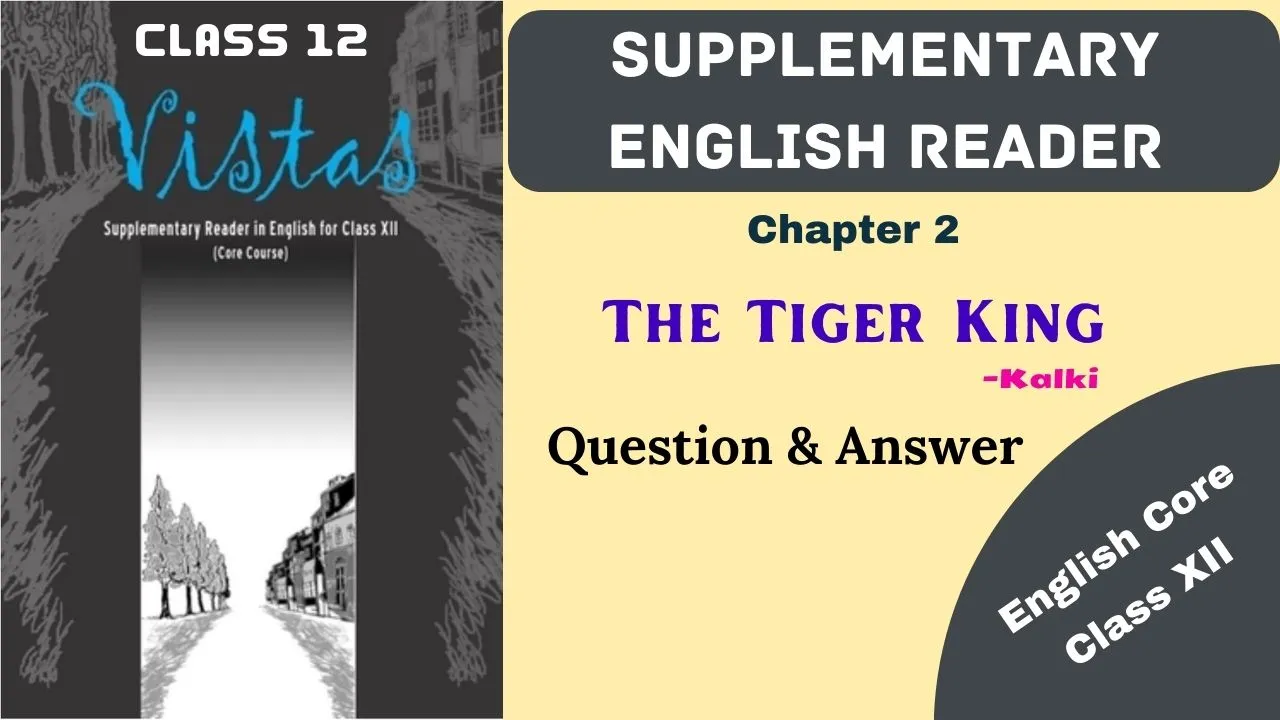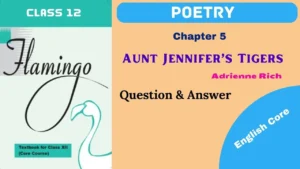The 2024 edition of “The Tiger King Class 12 Questions Answers” is a valuable study tool for CBSE Class 12 students. This edition features essential Q&A drawn from NCERT, as well as additional significant questions sourced from ‘Vistas,’ the supplementary English Reader for Class XII (Core Course).
Summary of the story, The Tiger King Kalki Class 12
“The Tiger King” by Kalki is a satirical short story set in a fictional kingdom. The ruler, the Tiger King, embarks on a quest to kill a hundred tigers to prove his bravery and break a supposed curse. In an ironic twist, he accidentally shoots a revered holy man who had transformed into a tiger. The prophecy comes true in an unexpected way, and the king meets his demise. The story critiques the frivolity of the king’s actions, emphasizing the irony that his obsession with killing tigers, intended to secure his rule, ultimately leads to his downfall. Kalki uses satire to comment on the folly of blind adherence to traditions and the unpredictable nature of fate.
Translation
कल्कि की “द टाइगर किंग” एक काल्पनिक साम्राज्य पर आधारित एक व्यंग्यात्मक लघु कहानी है। शासक, टाइगर किंग, अपनी बहादुरी साबित करने और कथित अभिशाप को तोड़ने के लिए सौ बाघों को मारने की खोज पर निकलता है। एक विडंबनापूर्ण मोड़ में, वह गलती से एक श्रद्धेय पवित्र व्यक्ति को गोली मार देता है जो एक बाघ में बदल गया था। भविष्यवाणी अप्रत्याशित तरीके से सच होती है, और राजा की मृत्यु हो जाती है। कहानी राजा के कार्यों की तुच्छता की आलोचना करती है, इस विडंबना पर जोर देती है कि अपने शासन को सुरक्षित करने के इरादे से बाघों को मारने का उसका जुनून अंततः उसके पतन का कारण बनता है। कल्कि परंपराओं के अंध-पालन की मूर्खता और भाग्य की अप्रत्याशित प्रकृति पर टिप्पणी करने के लिए व्यंग्य का उपयोग करते हैं।
People also ask
Q3 The Tiger King Class 12 Questions Answers MCQ Extract Based 1
Read the following extract and choose the correct option.
A. From that day onwards it was celebration time for all the tigers inhabiting Pratibandapuram. The state banned tiger hunting by anyone except the Maharaja. A proclamation was issued to the effect that if anyone dared to fling so much as a stone at a tiger, all his wealth and property would be confiscated.
The Maharaja vowed he would attend to all other matters only after killing the hundred tigers. Initially the king seemed well set to realise his ambition.
Not that he faced no dangers. There were times when the bullet missed its mark, the tiger leapt upon him and he fought the beast with his bare hands. Each time it was the Maharaja who won.
a) solemn.
b) sarcastic.
c) sympathetic.
d) mocking.
Ans: b) sarcastic
ii Pick the pair of TRUE statements based on the extract.
1. Tiger hunting was absolutely banned in the kingdom.
2. The Maharaja was extremely courageous and fearless.
3. The Maharaja paid no heed to matters related to his kingdom.
4. The Maharaja was able to fulfil his ambition, without any perils.
a) 1 and 2
b) 2 and 4
c) 2 and 3
d) 1 and 4
Ans: c) 2 and 3
iii In which of the following options can the underlined words NOT be replaced with ‘proclamation’?
a) The politician shared his manifesto during the election meeting.
b) All the citizens of the kingdom had to abide by the emperor’s edict.
c) The communique made by the official had a disastrous effect.
d) The decree of the state forbade cruelty against animals.
Ans: c) The communique made by the official had a disastrous effect.
iv On the basis of this passage, pick the option that enumerates the characteristics of the king.
1. gullible
2. arrogant
3. wilful
4. aggressive
5. apathetic
6. scrupulous
a) 1, 2 and 6
b) 3, 4 and 6
c) 3, 5 and 6
d) 2, 3 and 5
Ans: d) 2, 3 and 5
Q3 The Tiger King Class 12 Questions Answers MCQ Extract Based 2
Read the following extract and choose the correct option.
B. At midnight when the town slept in peace, the dewan and his aged wife dragged the tiger into the car and shoved it into the seat. The dewan himself drove the car straight to the forest where the Maharaja was hunting. When they reached the forest, the tiger launched its satyagraha and refused to get out of the car. The dewan was thoroughly exhausted in his efforts to haul the beast out of the car and push it down to the ground.
On the following day, the same old tiger wandered into the Maharaja’s presence and stood as if in humble supplication, “Master, what do you command of me?” It was with boundless joy that the Maharaja took careful aim at the beast. The tiger fell in a crumpled heap.
i Pick the option that uses the same figure of speech as ‘town slept in peace’.
a) His actions really flared up my temper, so I walked out.
b) She is going through a rollercoaster of emotions.
c) My alarm clock yells at me every morning until I get out of bed.
d) The children were screaming and shouting in the fields.
Ans: c) My alarm clock yells at me every morning until I get out of bed.
ii Pick the option that best describes the dewan’s attitude.
1. desperate
2. submissive
3. servile
4. dishonourable
5. detestable
6. flattering
a) 2, 3 and 6
b) 1, 4 and 5
c) 2, 4 and 6
d) 1, 3 and 5
Ans: a) 2, 3 and 6
iii Which of the following is NOT an example of ‘satyagraha’?
a) People on a hunger strike as a mark of protest against a law.
b) People resorting to violence to ensure their demands are accepted.
c) A few people blocking a roadway or passage peacefully.
d) People participating in a silent march to protest against injustice.
Ans: b) People resorting to violence to ensure their demands are accepted.
iv Pick the option that lists the display of ‘crumpled heap’.
a) Option i
b) Option ii
c) Option iii
d) Option iv
Ans: b) Option ii
Q 5 The Tiger King Class 12 Questions Answers Stand Alone MCQs
i ‘The Maharaja’s anxiety reached a fever pitch…’
Which of these sentences DOES NOT use the phrase ‘reached a fever pitch’ correctly.
a) When the bidding reached a fever pitch, one of the team’s absence was notable.
b) The excitement of the audience reached a fever pitch when they saw the star perform.
c) The scenic beauty of the place reached a fever pitch when it began to snow.
d) The climax of the film reached fever pitch when the protagonist was assassinated.
Ans: c) The scenic beauty of the place reached a fever pitch when it began to snow.
ii Pick the statement that is NOT an example of satire from the story.
a) The twist of fate when the toy tiger proved to be fatal for the king.
b) News of king’s ailment got the attention of not one, but three surgeons.
c) King wilfully exploiting nature and subjects for his selfish interests.
d) The king celebrates his triumph but readers anticipate his doom.
Ans: d) The king celebrates his triumph but readers anticipate his doom.
iii The story conveys the idea of transience of life and power. Pick the pair of proverbs that DO NOT relate to this idea.
1. Don’t put all your eggs in one basket.
2. There is many a slip between a cup and a lip.
3. Don’t count your chickens before they are hatched.
4. Don’t cross that bridge till you come to it.
a) 1 and 4
b) 2 and 3
c) 2 and 4
d) 3 and 4
Ans: b) 2 and 3
iv ‘Even the threat of a Stuka bomber will not throw me off track.’
This sentence shows that the author has a
a) firm resolve to narrate the story.
b) humorous way of conveying an idea.
c) logical style of convincing the reader.
d) rhetorical manner of writing a story.
Ans: b) humorous way of conveying an idea.
Q11 The Tiger King Class 12 Questions Answers in 30-40 words
Ans: Including several instances of satire in a story doesn’t necessarily make an author too cynical. Satire can be a powerful tool to critique society, human behavior, and institutions. It depends on how well the author balances humor and criticism to convey a meaningful message.
ii Knowing too much of your future is never a good thing.’ In light of this quote, examine how knowing the future paved way for the king’s end.
Ans: In the context of “Knowing too much of your future is never a good thing,” the quote suggests that foreknowledge can lead to undesirable consequences. In the story of the king, his awareness of the future may have influenced his actions, ultimately leading to his downfall.
iii. The Maharaja justified his actions based on the maxim: ‘You may kill even a cow in self-defence,’ so there would be no objection to killing tigers in selfdefence.’ Do you think it is right to justify our actions in this way? Elaborate.
Ans: Justifying actions based on a broad maxim can be problematic. While self-defense is a valid concept, applying it universally may lead to misuse. Context matters, and ethical considerations should guide actions. Blanket justifications risk oversimplifying complex situations and may not align with broader moral principles.
Q13 The Tiger King Class 12 Questions Answers in 120-150 words
Ans: Ladies and gentlemen, esteemed guests, and passionate young advocates,
I stand before you today not just as an environmentalist but as a guardian of a majestic species on the brink of extinction – the tiger. The urgency of our mission in the Save the Tiger campaign cannot be overstated. These magnificent creatures are the guardians of our ecosystems, and their survival is intertwined with our planet’s health.
To the youth, I implore you to join this noble cause. Our collective efforts can make a difference. Engage in awareness, support conservation initiatives, and challenge policies that threaten their habitats. Tigers symbolize strength and resilience; let us embody these qualities in our fight for their survival. Remember, our actions today shape the world they inherit tomorrow. Together, let’s roar for change and ensure the roar of the tiger echoes for generations to come. Thank you.
ii You visited a wildlife sanctuary recently and were appalled at the condition of the sanctuary and the plight of the animals there. Write an article for an e-zine expressing your concern and the need to alleviate the facilities at the sanctuary and provide the animals with a secure habitat.
Ans: Title: A Cry for Help: Urgent Upgrades Needed for Our Wildlife Sanctuaries
In a recent visit to a local wildlife sanctuary, my heart sank as I witnessed the deplorable conditions our precious animals endure. Dilapidated enclosures, inadequate medical facilities, and a lack of proper care have left these innocent beings in distress. It is our duty, as stewards of this planet, to ensure the well-being of these creatures.
It’s time to rally for change. We must allocate resources for immediate upgrades, focusing on secure habitats, improved medical infrastructure, and skilled caretakers. Our wildlife deserves better—clean environments, proper nutrition, and the chance to thrive. Let’s come together to support and rejuvenate our sanctuaries, creating havens where animals can live free from suffering. The time to act is now; our silent cohabitants are counting on us to be their voice in the face of neglect.
iii The king was callous as a ruler and behaved whimsically. Thus, the people in his kingdom suffered while he fulfilled his desire of killing a hundred tigers.
Do you find leaders or politicians in the world today being indifferent to the needs of the people and behaving in the same way? Comment with relevant examples.
Ans:
In contemporary times, instances of leaders or politicians displaying callousness and whimsical behavior to the detriment of their constituents sadly exist. Some leaders prioritize personal interests over public welfare, echoing the behavior of the fictional king. For example, some politicians may disregard pressing issues like poverty, healthcare, or education while pursuing self-serving agendas.
Leadership that neglects the needs of the people can be seen in various parts of the world, often resulting in social and economic disparities. The challenge lies in holding leaders accountable for their actions and fostering a culture of transparent governance. The comparison to historical or fictional figures serves as a reminder of the importance of ethical and responsible leadership in addressing the genuine needs and aspirations of the populace.
Extra The Tiger King Class 12 Questions Answers 2024
What is the ironical ending of the story The Tiger King for 7 marks?
Ans: “The Tiger King” by Kalki is a short story that ends ironically. The story revolves around a king who sets out to kill a hundred tigers to overcome a supposed curse. In his pursuit, he accidentally kills a holy man who had transformed into a tiger. The irony lies in the fact that the king’s initial quest to kill tigers to secure his rule ultimately leads to his own downfall. The prophecy of the holy man comes true in an unexpected way, showcasing the unintended consequences of the king’s actions and the irony of fate. This ending serves as a commentary on the unpredictability of life and the consequences of selfish and thoughtless actions.
Which matter about the Tiger King is of extraordinary interest?
Ans: In “The Tiger King” by Kalki, the matter of extraordinary interest revolves around the king’s quest to kill a hundred tigers. The king believes that by accomplishing this feat, he will overcome a supposed curse that predicts his death in the jaws of a tiger. This unusual and ambitious pursuit captures the attention of the people in the story, making it a matter of extraordinary interest due to its eccentricity and the unforeseen consequences that unfold as a result. The central theme of the story revolves around this peculiar obsession of the Tiger King, adding layers of irony and satire to the narrative.







